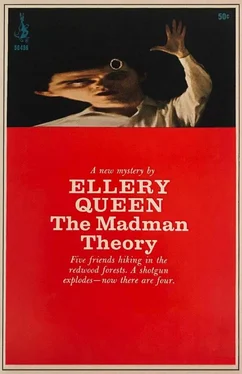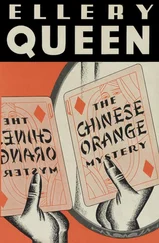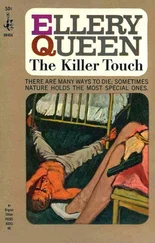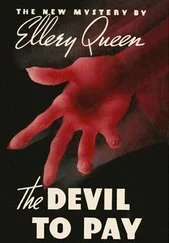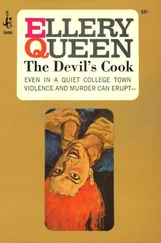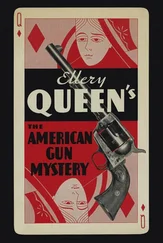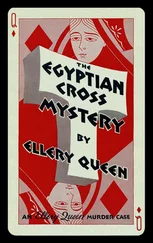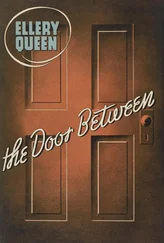“Oh, all the time. She wanted to go to Honolulu more than anything, stay at one of the fancy hotels.”
“Who doesn’t?” said her mother gloomily.
“Did she ever mention anybody of whom she was afraid?”
Rosemary considered. “She was afraid of her boss. She thought he was going to fire her.”
They drove up Lagua Seca Road, past San Jose, to the residence of Mrs. Donald Beachey, just within the Santa Clara city limits: a comfortable house in a middle-class neighborhood. The lawn was green and mowed; the hydrangeas were trimmed; the beds of lobelia and verbena were cultivated with affectionate care. The contrast with Molly Wilkerson’s desperate way of life was remarkable. It was easy to understand why Molly, when she telephoned her sister, spoke in a half snarl.
Collins and Loveridge walked up the path, crossed a sandstone-flagged patio flanked by century plants, and rang the bell. A short plump woman in skirt and blouse answered the door. Her hair was straight and brown-blonde and she wore it in no particular style. Collins estimated her age at about thirty-five — three or four years older than Molly. Her face was pale; her eyes showed traces of recent tears.
“You’re Mrs. Beachey?”
“Yes.” She looked from Collins to Loveridge and back with a sad expression. “You must be policemen?”
Collins introduced himself and Loveridge. “May we come in a moment?”
Mrs. Beachey backed away from the door. Collins and Loveridge stepped into a living room littered with toys. Mrs. Beachey made an apologetic gesture. “Just scrape things aside and sit down. I suppose you want to talk about Molly. I don’t know much about her private life. She’s always been secretive.”
“Did she mention that she might be in some sort of trouble?”
Edna Beachey essayed a smile. “She told me nothing. I don’t even know where she was working. I gather it was some night club.”
“Did your sister hint that she might be afraid of anyone, that she had an enemy?”
“No. She seemed quite cheerful except for being short with the children.”
“Did she leave you any message, or letter, to be opened in the event of her death?”
“No. Why should she do anything like that?”
“Well, to be frank, Mrs. Wilkerson may conceivably have been attempting to extort money from a dangerous person.”
Edna Beachey drew a deep breath. “Yes, that would be Molly... So that’s why she wanted to stay here.”
“That’s my guess,” nodded Collins. “She never mentioned any names or circumstances which might be relevant to her death?”
“To tell you the truth, Inspector, when Molly came to visit me — which wasn’t often — she talked incessantly. The only way I could keep my sanity was to pay no attention to her.”
“Did she ever mention her ex-husband, Redwall Kershaw?”
“Is that the race-track man? She spoke of him once or twice. Not recently, though.”
“What about a man named Steve Ricks?”
“It seems to me he was one of her beaus. But I never met him.”
“May we look at her room?”
Mrs. Beachey took them to a bedroom with a nice green carpet and curtains of green and white flowered chintz. There were twin beds with blue and green striped spreads, both neatly made. “This is my guest room. Molly’s children slept in the one bed, Molly in the other.”
“Where are her belongings?”
“She didn’t bring very much. Just a few odds and ends. In the closet and the chest.”
In the closet was a large fiberboard suitcase.
“That’s Molly’s suitcase,” said Mrs. Beachy. It’s the only one she brought. The children don’t have much to wear.”
Loveridge tested the suitcase. “It’s locked.” He brought it out, shook it. From within came a rattling sound.
“Do you have a key?” Collins asked Mrs. Beachey.
“No. I can’t understand why Molly would want to lock it. I never pried into her affairs.”
Loveridge brought forth a pocketknife, cut a slit around the frame. The top flapped back. Inside they found a black patent-leather purse and a pair of black high-heeled shoes.
Collins looked into the purse. Within were a lipstick and a long flat key. Stamped on the handle was:
U.S. POST OFFICE
San Jose, California
1126
“This is what we’re looking for,” said Collins. “At least I hope it’s what we’re looking for.”
“Why in the world would she need a post-office box?” asked Mrs. Beachey.
“We’ll find out in due course. By the way, did Mrs. Wilkerson write any letters while she was here?”
“I really couldn’t say.”
She had nothing more to tell. Collins and Loveridge drove toward the San Jose Post Office.
Loveridge’s manner had become less absolute; he chewed at his mustache in frank puzzlement. “Why wouldn’t she carry the post-office key in her purse with the rest of her keys? Why lock it in the suitcase?”
Collins was thoughtfully silent. Loveridge went on, “As I see it, she wrote the murderer a letter — something like, ‘Dear sir, I know everything. And I will tell the police unless you pay me ten thousand dollars. Send in twenty dollar bills to Henry Jones, P.O. Box 1126, San Jose.’ This way she thinks she’s protected. The murderer can’t identify her, and she doesn’t need to worry.”
“She worried enough to move in with her sister,” said Collins. He ruminated a moment. “You’re probably right about the letter. She couldn’t have known too much, but that wouldn’t prevent her from claiming omniscience. And she would have written: ‘Don’t try any tricks; I have arranged for information to be sent to police in case something happens to me.’ ”
“But where is the information?” demanded Loveridge. “Was she bluffing? Did the murderer know she was bluffing? It’s a strange situation.”
“It’s strange,” nodded Collins. “I’m anxious to see what’s in Box 1126. She might have locked the key in the suitcase for a reason.”
Loveridge’s china-blue eyes bulged with interest. “You mean—”
“A letter addressed to, ‘Henry Jones, Box 1126. If not delivered in ten days, forward to Chief of Police.’ ”
“By golly! I believe you’re right!” Loveridge’s superiority had now dissolved. “Let’s get there!”
The postal boxes, serried ranks of dull bronze and glass, occupied the far end of the post-office lobby and the walls of an alcove. Box 1126 was in this alcove. But it was now an orifice. There was no door on it. The front was gone.
At a window Collins attracted the attention of a clerk. “We’re police officers. What’s the story on Box 1126?”
The clerk surveyed them from below his green eyeshade. “I’ll tell you one thing — it’s a federal offense, and that’s no laughing matter.”
“What happened?”
“Last night someone comes in and jimmies the box door. These doors aren’t built to withstand assault. He’ll regret it, whoever he is. Once the Feds get on a man’s tail, they never let up.”
“What time did this happen?”
“Hard to say. Some time after six, probably.”
“What’s missing? What was in the box?”
“No idea. You’ll have to get that information from the boxholder.”
“No chance of that,” said Collins. “She’s dead. That’s why we’re here. No one witnessed the act?”
“Nobody’s come forward, but it’s hardly likely the crime was seen. It would only take a minute: put one of these new ripping bars into the crack, give a yank, and the door flies open.”
“Who fills the boxes?”
“I do. That’s part of my duties.”
“Do you remember what was in that box?”
Читать дальше
